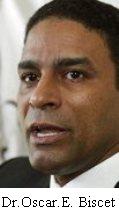Dr. Oscar Elías Biscet
Presidente de la Fundación Lawton de Derechos Humanos
Presidente del Proyecto Emilia
Medalla Presidencial de la Libertad
Sígame en: http://www.twitter.com/@oscarbiscet
This article was originally published by The Wall Street Journal
Recent protests show the people’s resolve to end the communist dictatorship
In 2010 Cuba’s Castro regime began releasing journalists and human rights activists, most of whom it had imprisoned seven years earlier during the Black Spring crackdown on political dissent. Upon release, most of the prisoners were exiled to Spain. But I refused to accept exile as the price of freedom. My refusal cost me another year in prison, but has since allowed me to witness courage and hope take root in a nation long mired in fear and despair.
In Cuba, there is no freedom of speech or assembly. Those who dare to speak out against the government’s abuses risk detention and worse.
That is why it was so inspiring to see the antigovernment protests that erupted spontaneously this summer throughout Cuba. Tens of thousands of my countrymen in more than 60 cities and towns participated. Most weren’t human rights advocates or democracy activists. They were ordinary Cubans: men and women; white, black and mestizo; young and old; rural and urban.
Everyone seems to know someone who protested—a family member, neighbor, friend or coworker. This has helped expose the government’s ridiculous lie that the protesters were U.S.-financed mercenaries.
The Cuban government responded as insecure, authoritarian police states do—with violence. Miguel Díaz-Canel, the head of Cuba’s government, issued commands for citizens to “battle” the protesters and urged communist loyalists to violently “defend” the revolution. “We call on all revolutionaries across the country, all communists, to take to the streets,” he said in a nationally televised address. “The order for combat has been given.”
Cuban security forces and civilian communists beat many protesters with clubs and sticks. By one estimate, more than 700 people are still being detained by the government, and perhaps dozens who were apprehended remain unaccounted for.
I asked friends across Cuba about their experiences with the protests. Several described seeing heavily armed, black-clad troops from the ministry of the interior raid their neighborhoods as if fighting a military insurgency.
A friend from San Antonio de Los Baños, the city south of Havana where the protests began, described walking into the streets to protest alone, then meeting a friend who joined him in shouting “Freedom!” and other antigovernment slogans. As they approached a park at the city center, they were encouraged to find “a rebellious crowd shouting against the regime.”
A friend from Bauta, a small town west of Havana, said at first he was hesitant to join because one of his three children had Covid-19 and he didn’t want to infect anyone. But thoughts of his children’s future made him reconsider. “I felt pleased with myself [for participating],” he said, adding ruefully, “Now I can die.”
What exactly are Cubans protesting? Many media outlets have focused on the government’s poor response to the Covid-19 pandemic, the dismal state of the Cuban economy and the lack of medicine and basic food. But this is misleading. The protests are fundamentally about repression. The protesters are demanding accountability and transparency from an autocratic, secretive government. They are demanding freedom of the press and religion from a regime built on propaganda and intolerant atheism. Put simply, the protests are a manifestation of the Cuban people’s resolve to end the 62-year-old communist dictatorship. According to one study, 74% of the protests were primarily related to political and civil rights, while the remaining 26% had to do with the economy.
The Castro regime modeled the Cuban government on the Soviet Union, and it was subsidized by the latter until its demise. Just like the U.S.S.R., Havana tries to control every aspect of its subjects’ lives. It’s an Orwellian state where citizens have been conditioned to distrust one another. Despair hangs heavy in the air. Even a whisper against the government can provoke harassment, beatings, detention and job loss, as it did for me, a physician, and my wife, Elsa, a nurse, after we began speaking out decades ago against the regime’s abuses.
In a country where the walls have ears, it’s easy to lose one’s voice. But that is changing. The regime is weak, and the people sense it. Two chants heard often during the protests were “We are not afraid!” and “We are no longer afraid!” For decades, the best that many Cubans could hope for was to escape. But now, more and more of us are taking responsibility for reshaping our homeland.
The protests have subsided for now, but the resolve to bring about a better life has been kindled in the hearts of the Cuban people. We won’t turn back. We are on the right path and the winds are in our favor.
La Nueva Nación es una publicación independiente cuyas metas son la defensa de la libertad, la preservación de la democracia y la promoción de la libre empresa. Visítenos en : http://www.lanuevanacion.com


